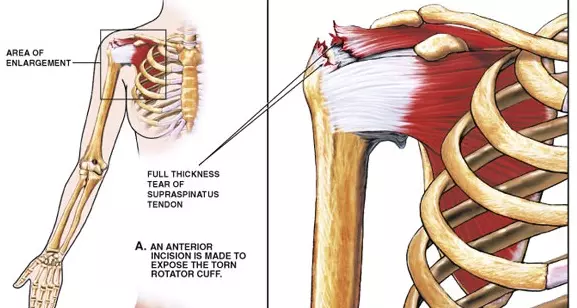- Home
- Patient Care
- Services
- Shoulder & Elbow
- Overview
- Rotator Cuff
- Concerns about rotator cuffs - why operate?
Concerns about Rotator Cuffs - Why Operate?
A rotator cuff repair is a very reliable operation for pain relief and restoration of shoulder strength and function. Surgery is necessary because once a rotator cuff tendon is torn, it does not heal by itself. Because the tendon is attached to muscle, the muscle pulls on the tendon and causes a certain degree of retraction leaving a gap. This gap never fills in, and the tendon remains torn unless a surgical repair is performed. Full-thickness tears result in progressive muscle wasting (atrophy) over time. Advanced stages of muscle wasting are irreversible, even with surgery — one reason why your surgeon may
recommend early surgery once the diagnosis is made.
Many factors can affect rotator cuff tendon healing after surgery. Tears are easier to repair earlier rather than later and when they are smaller rather than larger. Tears occurring in patients younger than 65 are much more likely to heal than tears in older patients. In some cases, tears can be so large and have been present for so long that they are not repairable. Often, this cannot be determined until the time of surgery. Tobacco use has been shown to impair healing after rotator cuff surgery and in some cases may have contributed to the original tear.

Rotator cuff tears can be painful and can often lead to weakness as well. Pain may result from the tear itself or bursitis that forms as a result of the tear. A rotator cuff repair is a very reliable operation for pain relief and restoration of shoulder strength and function. Tendon tissue heals much more slowly than other tissues in your body. For example, if you cut your skin, it will fairly reliably be healed in 7 to 10 days. Rotator cuff tendon tissue, however, heals over a period of six to twelve weeks. While the goal of surgery is to restore a pain-free and functional shoulder there may be some limitation based on the age and the size of the tear. In larger tears or tears in older patients, the tendon repair may not heal. In these cases, pain relief and function are usually good; however, some weakness usually remains in the shoulder. In general, about 90% of patients are satisfied with their shoulders after rotator cuff repair and have significant improvements in pain and function after surgery.
>>Next topic: Biceps Tendon